
The red-necked spurfowl or red-necked francolin, is a gamebird in the pheasant family Phasianidae that is a resident species in southern Africa.

The yellow-fronted canary is a small passerine bird in the finch family. It is sometimes known in aviculture as the green singing finch or the ‘’’green singer’’’.

Brachystegia is a genus of tree of the subfamily Detarioideae that is native to tropical Africa.
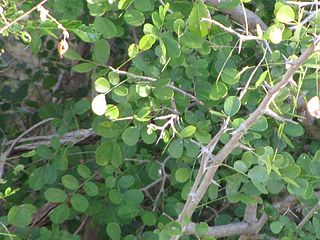
Dalbergia melanoxylon in french Granadille d'Afrique is a flowering plant in the family Fabaceae, native to seasonally dry regions of Africa from Senegal east to Eritrea, to southern regions of Tanzania to Mozambique and south to the north-eastern parts of South Africa. The tree is an important timber species in its native areas; it is used in the manufacture of musical instruments, sculptures vinyago in Swahili language and fine furnitures. Populations and genomic resources for genetic biodiversity maintenance in parts of its native range are threatened by overharvesting due to poor or absent conservation planning and by the species' low germination rates.

Thespesia is a genus of 14 flowering shrubs and trees in the Hibiscus family, Malvaceae, although within the family they are more closely related to cotton plants (Gossypium). The genus is distributed from the South Pacific through Asia, Africa, and the Caribbean.

Ocimum is a genus of aromatic annual and perennial herbs and shrubs in the family Lamiaceae, native to the tropical and warm temperate regions of all 6 inhabited continents, with the greatest number of species in Africa. It is the genus of basil and its best known species are the cooking herb great basil, O. basilicum, and the medicinal herb tulsi, O. tenuiflorum.
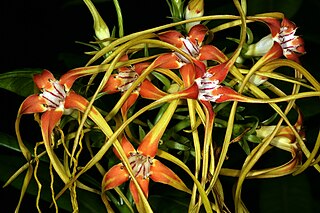
Strophanthus is a genus of flowering plants in the family Apocynaceae, first described as a genus in 1802. It is native primarily to tropical Africa, extending to South Africa, with a few species in Asia from southern India to New Guinea and southern China. The genus name is a compound of the Greek words στρόφος (stróphos) "twisted cord" and ἄνθος (ánthos) "flower", in reference to the corolla lobes which, in some species - notably S. petersianus - resemble long twisted ribbons or threads and can reach a length of 30–35 cm. This trait, in addition to colouring involving combinations of bright pinks, purples and oranges, combine to make the flowers among the most ornamental in the plant kingdom.

The bushy-tailed mongoose is a mammal in the family Herpestidae found in central Africa, from southern Kenya to central Mozambique.

The flappet lark is a species of lark in the family Alaudidae that is widespread across Sub-Saharan Africa. The name flappet originates from the distinctive wing flapping sound made during its breeding season.

The grey penduline tit, also known as the African penduline-tit, is a species of bird in the family Remizidae. It is found in Angola, Botswana, Burundi, Republic of the Congo, Democratic Republic of the Congo, Eswatini, Kenya, Malawi, Mozambique, Namibia, Rwanda, South Africa, Tanzania, Uganda, Zambia, and Zimbabwe. Its natural habitats are subtropical or tropical dry forests, dry savanna, and moist savanna. At 8 to 9 cm in length and a weight of 6.5 g (0.23 oz), it is one of the smallest species of bird found in Africa, along with its cousin the Cape penduline tit and the perhaps smaller mouse-colored penduline tit and the tit hylia.

Aneilema is a genus of monocotyledonous plants of approximately 60 species. The vast majority of the species are native to sub-Saharan Africa, but a few are found in Oceania and one, Aneilema brasiliense, is from South America. It is the third largest genus in the family Commelinaceae after Commelina and Tradescantia, and it is one of only six genera in the family to occur in both the Eastern Hemisphere and the Western Hemisphere.
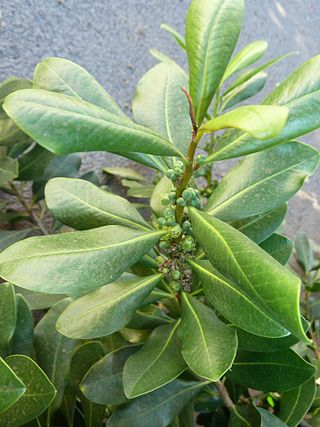
Warburgia is a genus of flowering plants in the family Canellaceae described in 1895. It was named for the German botanist Otto Warburg. It is native to eastern and southern Africa.

Vahlia is a genus of herbs and subshrubs that grow in Africa and the Indian subcontinent. There are at least five species.
Bennigsenium is a genus in the beetle family Cicindelidae. There are about 11 described species in Bennigsenium, found in Africa.
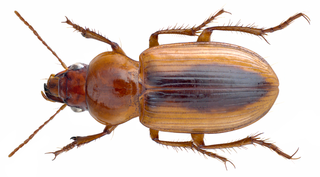
Boeomimetes is a genus in the beetle family Carabidae. There are about five described species in Boeomimetes, found in Africa.

Bradybaenus is a genus in the beetle family Carabidae. There are about 16 described species in Bradybaenus.
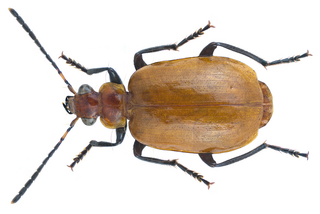
Lebistina is a genus in the beetle family Carabidae. There are about 14 described species in Lebistina.

Amorphomerus is a genus in the beetle family Carabidae. There are at least two described species in Amorphomerus.
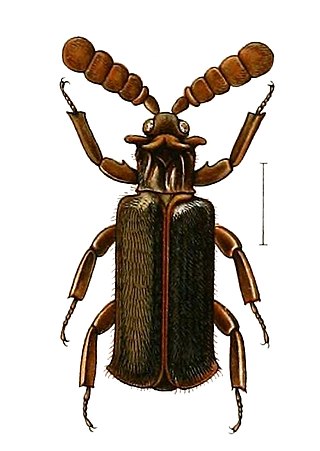
Pentaplatarthrus is a genus of in the beetle family Carabidae. There are about eight described species in Pentaplatarthrus, found in Africa. These are ant nest beetles and are obligate myrmecophiles, predatory on ant larvae and workers.

Zeria is a genus of solpugid camel spiders, first described by Eugène Simon in 1879.



















